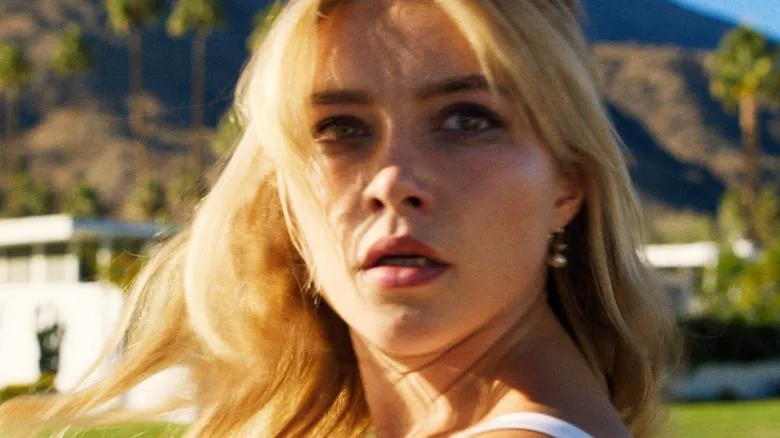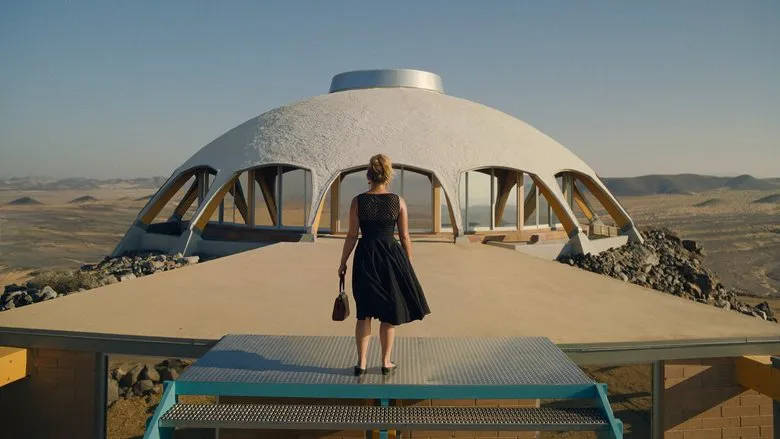“Don’t Worry Darling”: A Retro Nightmare Wrapped in Feminist Critique
In the idyllic, yet unsettling, setting of a 1950s American secret city, perfectly coiffed housewives lead seemingly perfect lives. Their days are filled with domestic duties, cocktail hours, and discussions about children, husbands, and the latest fashions. Meanwhile, their husbands, clad in sharp suits, drive off each morning in polished cars to mysterious jobs. Alice (Florence Pugh), like her neighbors, appears content in her marriage to Jack (Harry Styles). She sends him off to work in nothing but his dress shirt and greets him in the evening in a glamorous dress, ready for romance. But beneath the surface of this picture-perfect existence, a nagging question begins to plague Alice: “What lies beyond the borders of this community, and why are we forbidden from leaving?”

If this synopsis conjures up images of other well-known films and series, you might be able to predict the ending of “Don’t Worry Darling,” the second feature film directed by actress Olivia Wilde. Her first directorial effort, the teen comedy “Booksmart” (2019), garnered surprising critical acclaim despite being overshadowed by both classic 2000s comedies (“Mean Girls”) and more contemporary takes on the genre (“Lady Bird”). It’s unclear what drew Wilde to the high school setting in the first place, as it felt like a project that could have been produced by any major studio. However, with “Don’t Worry Darling,” the “why” is much clearer: Olivia Wilde is a feminist, and her new project is a commentary on the control that power-hungry men exert over women.

“Don’t Worry Darling” is a dystopian thriller reminiscent of “The Truman Show.” The residents live in identical houses, engage in superficial conversations, and the entire environment feels artificial and sterile, like a meticulously crafted advertisement. Alice is the protagonist of this manufactured world, and her days are monotonous: she prepares coffee and bacon and eggs in the morning, cleans spotless windows and a gleaming bathroom, spends time with her neighbors, and eagerly awaits her husband’s return in the evening. However, during one of the parties, Alice notices the strange behavior of Margaret (Kiki Layne), who insists that something is being hidden from them. This, of course, turns out to be true, but it’s not crucial to the film’s analysis. What’s more important is the way Olivia Wilde chose to deliver (or rather, capitalize on) her critique of male-dominated society. She opted for the most straightforward genre, one that teeters on the edge of being overly stylized.

Questioning Reality and Mental State
As Alice begins to ask “unnecessary” questions of her husband and neighbors, Jack calls a doctor who prescribes her antidepressants. In doing so, Wilde addresses the long-standing issue of bored housewives’ dependence on medication, a problem that has plagued the United States since the 1950s. This theme is also explored in films like “Call Jane” and “Rosemary’s Baby.” However, Wilde invites the audience to question Alice’s mental state: Alice wraps her head in plastic wrap, the space around her seems to shrink, and the eggs she cooks turn out to be empty. This undermines the script because the ambiguity of what is real makes all the events in the film questionable. In “Black Swan” and “Joker,” the filmmakers make it clear that their protagonists are losing their minds, but Olivia Wilde leaves the audience with an unresolved ambiguity.

Missed Opportunities and Unequal Pay
Conceptually, the film falls short of its predecessors, even when not compared to classics like “Rosemary’s Baby” and “The Truman Show.” “Don’t Worry Darling” is weaker than many episodes of “Black Mirror,” which also explores pressing contemporary issues. Wilde’s work lacks dynamism; with a runtime of two hours, it indulges in repetitive scenes instead of building tension between the characters. As a dystopian film, “Don’t Worry Darling” is rather tame. It would have been more impactful if the filmmakers had focused on the horrors of life in “paradise” without the schizophrenic scenes: the impossibility of obtaining an abortion, complete dependence on men, and critical inequality in society.
Ironically, the film itself became an example of inequality. Rumors circulated that Harry Styles received a salary three times higher than Florence Pugh’s. While one might justify this disparity by citing the singer’s fame, which was crucial for the film’s marketing (and its inclusion in the Venice Film Festival), his relationship with Olivia Wilde casts a shadow over the situation. Watching “Don’t Worry Darling,” it’s clear that Pugh carries the entire film with her acting. In scenes with Styles, the camera often focuses on his face in profile, while hers is shown head-on. Unfortunately, in the real world, the male actor received all the media attention due to a fabricated spitting incident at the premiere. As they say, much ado about nothing.